In the realm of body art, tattoos have always held a significant place. They serve as expressions of identity, culture, and personal beliefs. One particular style that exudes an enigmatic allure is the Yakuza tattoo. Renowned for its intricate designs and deep symbolism, Yakuza tattoos carry a rich history rooted in Japan’s criminal underworld. In this comprehensive article, we delve into the captivating world of Yakuza tattoo meanings, symbolisms, and designs, exploring their profound significance and shedding light on their cultural relevance.
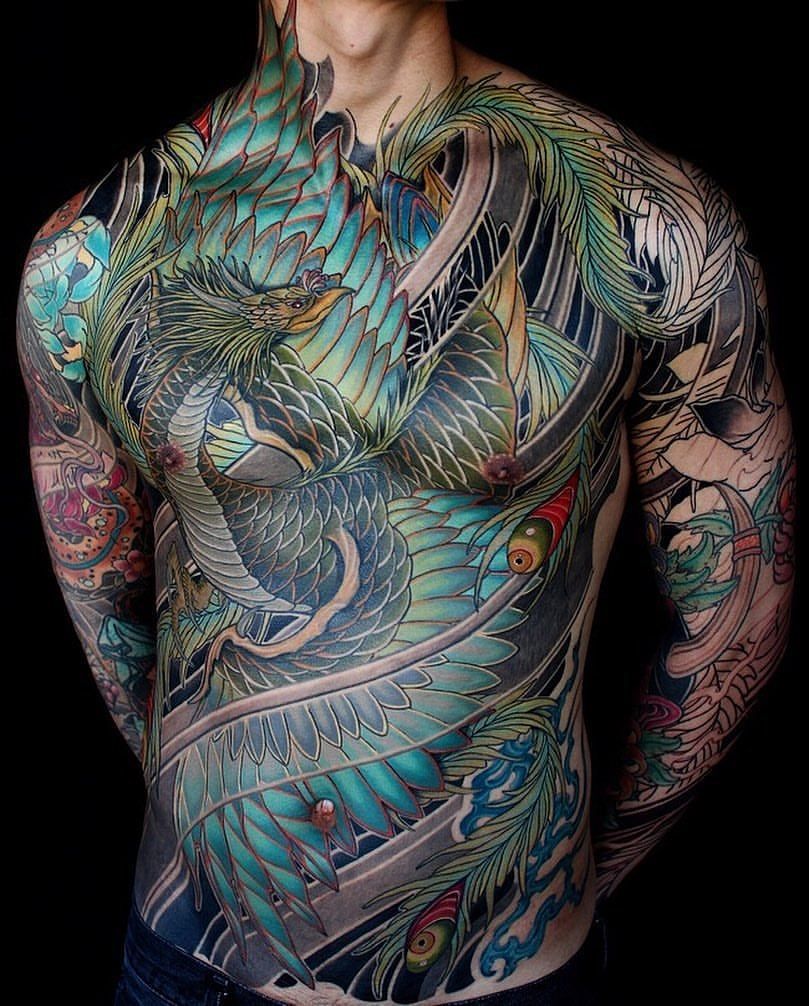
Yakuza Tattoo Meanings: Unveiling Hidden Messages
Yakuza tattoos bear profound meanings that go beyond mere aesthetics. These inked artworks tell intricate tales of honor, loyalty, and personal achievements within the Yakuza organization. Let’s explore the profound meanings behind these intriguing tattoos:
Representing Loyalty and Brotherhood
Yakuza tattoos, which are deeply rooted in Japanese culture and tradition, hold significant meanings that reflect the sentiments of brotherhood, loyalty, and unbreakable bonds among Yakuza members. These tattoos are not merely decorative but serve as powerful symbols of identity and affiliation within the Yakuza criminal organization.
One common motif found in Yakuza tattoos is intertwined dragons. Dragons are revered creatures in Japanese folklore, symbolizing strength, wisdom, and protection. The intertwining of these dragons represents the close connection between Yakuza members, suggesting a bond that cannot be easily severed. This imagery underscores the idea that Yakuza members are like family, bound by a code of honor and loyalty to one another.
Another prevalent design element in Yakuza tattoos is the depiction of koi fish swimming upstream. The koi fish, known for its perseverance and determination, is a symbol of ambition, resilience, and the ability to overcome adversity. By portraying the koi fish swimming against the current, Yakuza members convey their refusal to surrender or give in to challenges. It signifies their unwavering commitment to their organization and their willingness to face any obstacles that come their way.
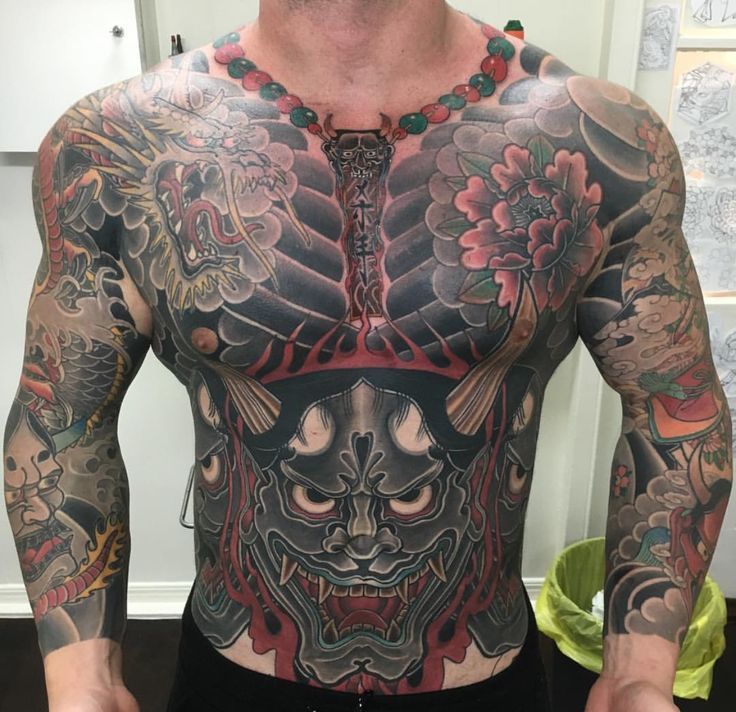
These tattoo designs serve as a visual declaration of the Yakuza’s core values and principles, showcasing their dedication to the brotherhood and their readiness to protect and support one another. The permanence of these tattoos further emphasizes the lifelong commitment expected from Yakuza members.
Apart from symbolizing brotherhood and loyalty, Yakuza tattoos often incorporate other elements that represent personal achievements, ranks, and affiliations within the organization. Such additional elements may include images of flowers, animals, mythical creatures, traditional Japanese symbols, or even calligraphy featuring significant words or phrases.
It’s important to note that Yakuza tattoos have a complex history and cultural significance specific to Japan. They are illegal in some public places due to their association with organized crime and the negative connotations surrounding the Yakuza. However, it is essential to understand that not all individuals with these tattoos are involved in criminal activities. For some, these tattoos serve as expressions of personal beliefs, cultural heritage, or a way to honor the traditions and values associated with the Yakuza.
Displaying Strength and Resilience
Yakuza tattoos hold significant meaning within the Japanese criminal organization known as the Yakuza. These tattoos are not merely decorative; rather, they serve as powerful symbols representing the strength and endurance of its members. When a Yakuza member undergoes the process of tattooing, it is both a physically and spiritually demanding journey.
The choice of images in Yakuza tattoos often includes fierce animals such as tigers, lions, and wolves. These creatures possess qualities that align with the values upheld by the Yakuza. Tigers, for instance, embody power, fierceness, and fearlessness. They are renowned for their physical strength, agility, and hunting prowess, traits that resonate deeply within the Yakuza culture. Lions, known as the kings of the animal kingdom, symbolize leadership, authority, and bravery. Wolves, on the other hand, epitomize loyalty, perseverance, and adaptability.
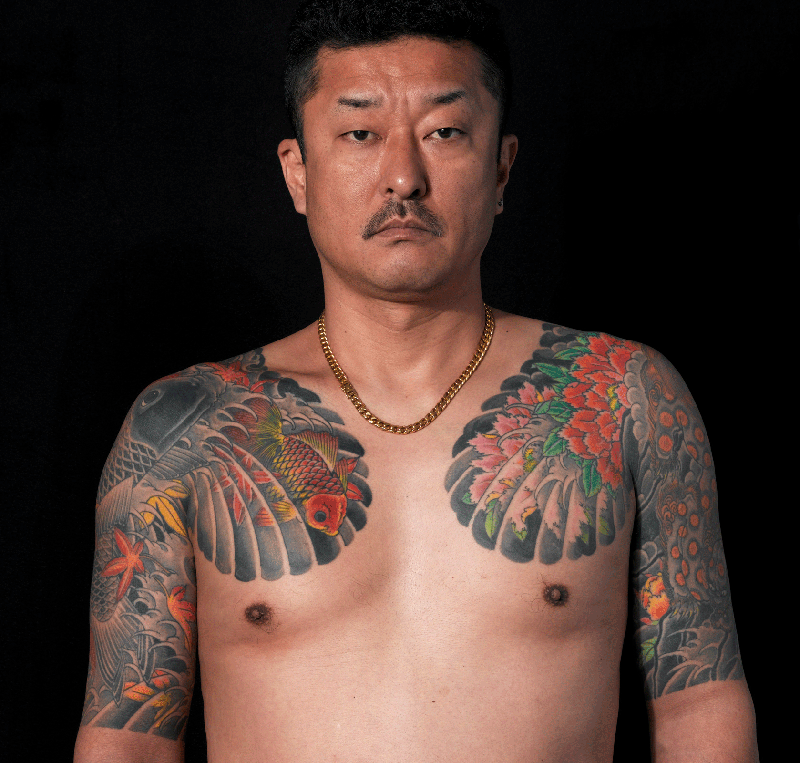
By adorning their bodies with these animal motifs, Yakuza members seek to reflect their own indomitable spirit. These tattoos become a visual representation of the wearer’s personal characteristics, showcasing their ability to withstand hardship, confront challenges head-on, and emerge victorious. The images chosen for Yakuza tattoos are carefully selected to project an aura of power, courage, and resilience, which are integral aspects of the Yakuza code.
Beyond their symbolic meaning, Yakuza tattoos also serve as a form of identification within the criminal underworld. These intricate and elaborate designs act as permanent badges of honor, signifying one’s allegiance to the Yakuza family and their unwavering commitment to the organization’s principles. The tattoos function as a visual language, allowing fellow Yakuza members to recognize and respect each other’s affiliations.
The process of getting a Yakuza tattoo is arduous and lengthy, often spanning several years. The method employed is called irezumi, a traditional Japanese technique that involves using hand-held steel needles to meticulously ink the design onto the skin. This method requires immense skill and expertise, as well as a high tolerance for pain. The tattooing process itself is seen as a rite of passage, symbolizing the member’s dedication, endurance, and commitment to the Yakuza way of life.
Portraying Personal Achievements and Rank
Yakuza tattoo meanings are deeply rooted in the traditions and culture of this notorious Japanese organized crime syndicate. These tattoos, known as irezumi, hold significant symbolism and serve as badges of honor for Yakuza members. Each mark on their bodies represents various achievements, such as successful missions, acts of bravery, or milestones within the criminal underworld.
The Yakuza view their tattoos as a form of self-expression, loyalty, and commitment to their organization. It is believed that the pain endured during the tattooing process serves as a test of one’s resilience and dedication to the Yakuza way of life. Additionally, these intricate tattoos are seen as a means of distinguishing oneself from ordinary society, marking the wearer as a member of an exclusive and secretive group.

The designs of Yakuza tattoos are highly detailed and often cover large portions of the body, with full-body suits being reserved for high-ranking members. These elaborate patterns typically incorporate traditional Japanese motifs, such as dragons, koi fish, gods, demons, and mythical creatures. Each element holds its own symbolism, contributing to the overall narrative depicted by the tattoo.
Dragons, for example, represent power, strength, and protection. The koi fish symbolize perseverance and determination, as they swim upstream against the current. Gods and demons can represent both benevolent and malevolent forces, reflecting the duality of life and the Yakuza’s role as both protectors and perpetrators. Other elements like cherry blossoms may signify the transient nature of life, reminding Yakuza members of the impermanence and fragility of their existence.
The placement of Yakuza tattoos also carries significance. Often starting from the shoulders and extending down to the waist, back, and even limbs, these tattoos create a visually striking and intimidating presence. They also serve as a visual record of an individual’s accomplishments and status within the hierarchy of the Yakuza. The more tattoos a member has, the more respected and feared they are within the organization.
However, it is important to note that in recent years, public perception of Yakuza tattoos has shifted. Due to their association with criminal activities, Yakuza tattoos have become stigmatized in Japanese society. Many public establishments, such as hot springs, gyms, and swimming pools, prohibit individuals with visible tattoos from entering their premises. This has led some Yakuza members to opt for less conspicuous tattoos or even laser removal to avoid societal scrutiny.
Honoring Ancestral Heritage
Yakuza tattoos hold deep meanings and serve as powerful visual representations of the wearer’s affiliation with the Yakuza, a notorious Japanese organized crime syndicate. These tattoos are intricate and often cover large areas of the body, such as the back, chest, arms, and legs. By adorning their bodies with these symbols, Yakuza members communicate their strong ties to their cultural heritage and demonstrate reverence for their lineage.
One of the most prominent motifs found in Yakuza tattoos is the dragon. Dragons symbolize strength, power, and protection. They represent the mythical creature’s ability to navigate through adversity and emerge victorious. Yakuza members ink these dragons onto their bodies to convey their indomitable spirit and capability to overcome challenges in the criminal underworld.
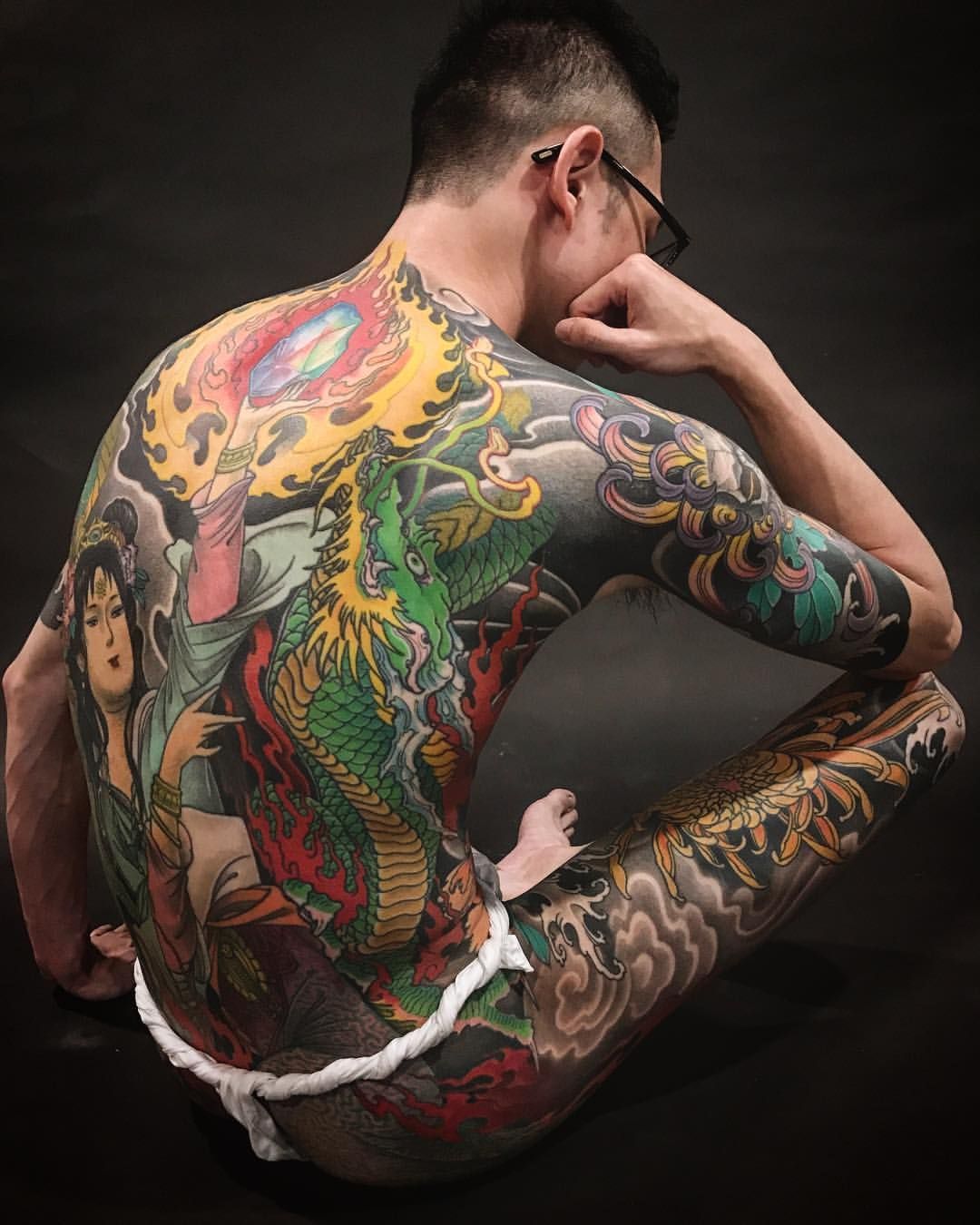
Another popular image is the koi fish, which holds various meanings depending on its direction. A swimming upstream koi represents perseverance and determination to achieve one’s goals, while a downward swimming koi signifies having already achieved success. The koi fish also embodies courage and resilience, making it an ideal choice for Yakuza members who face constant dangers and risks in their line of work.
Chrysanthemum flowers, known as “kiku” in Japanese, are significant in Yakuza tattoo artistry. These blooms symbolize the imperial family and are associated with honor, loyalty, and respect. Yakuza members incorporate chrysanthemums into their tattoos as a testament to their devotion to their organization and their readiness to sacrifice for its cause.
In addition to these widely recognized symbols, Yakuza tattoos often include waves, geisha, samurai, tigers, and other traditional Japanese elements that carry specific meanings. Waves, for instance, represent life’s ups and downs and evoke sentiments of adaptability and resilience. Geishas reflect elegance, mystery, and the balance between beauty and strength. Samurai embody unwavering loyalty, discipline, and the way of the warrior. Tigers symbolize bravery, ferocity, and protectiveness.
Yakuza tattoos are more than just elaborate body art; they serve as a visual language within the criminal underworld. These tattoos announce an individual’s affiliation with the Yakuza, conveying their adherence to a strict code of conduct and their commitment to their fellow members. They act as a badge of honor, displaying the wearer’s loyalty, courage, and readiness to face any challenges that come their way.
Signifying a Life Committed to the Yakuza Code
Yakuza tattoos hold deep significance within the Japanese criminal organization known as the Yakuza. These intricate and elaborate designs are not merely decorative but carry immense weight, symbolizing a lifelong commitment to the organization and its values.
Yakuza tattoos, also known as irezumi, serve as powerful reminders of the responsibilities and obligations that come with being part of the Yakuza brotherhood. These tattoos are earned through acts of loyalty, honor, and personal sacrifice. Each tattoo tells a story, reflecting the individual’s role and status within the organization.
The process of acquiring a Yakuza tattoo is not a casual decision; it requires dedication and unwavering devotion to the Yakuza way of life. The pain endured during the extensive tattooing process further solidifies an individual’s commitment and willingness to endure hardships for the sake of the brotherhood.
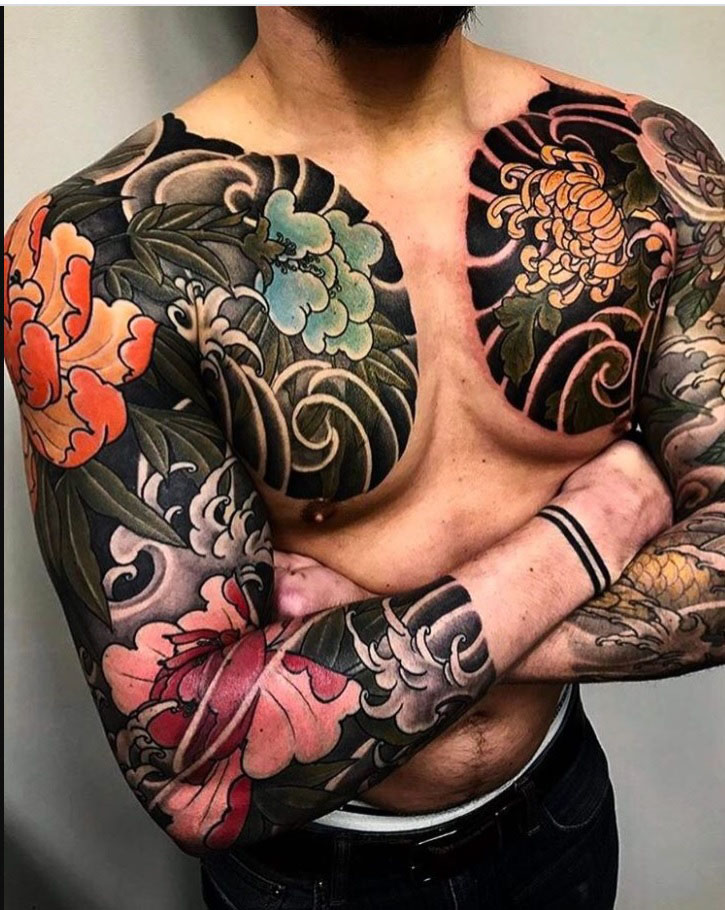
The designs of Yakuza tattoos often incorporate traditional Japanese motifs, such as dragons, koi fish, geishas, samurais, cherry blossoms, and mythical creatures. These symbols hold specific meanings that embody various virtues or aspects of the Yakuza lifestyle.
For example, a dragon represents power, strength, and protection, signifying the Yakuza’s dominance and authority in their world. Koi fish symbolize perseverance and determination, representing the Yakuza member’s journey through life’s challenges. Geishas may represent beauty and elegance, while samurais embody loyalty, honor, and duty. Cherry blossoms symbolize the transient nature of life and remind Yakuza members to live each day to the fullest.
In addition to these traditional symbols, Yakuza tattoos often feature intricate patterns and full-body coverage. This aesthetic choice signifies the commitment to the Yakuza way of life, leaving no room for anonymity or escape from the organization’s embrace.
These tattoos serve as marks of identity within the Yakuza community. They provide a visual representation of an individual’s loyalty, courage, and dedication to the brotherhood. Yakuza members wear their tattoos proudly, displaying them as badges of honor while also serving as a warning to outsiders of their affiliation.
However, it is important to note that in recent years, Japanese society has developed a negative perception of visible tattoos due to their historical association with criminal activity. As a result, Yakuza members often face social stigma and discrimination, particularly in more conservative environments.
Yakuza Tattoo Symbol Meanings: Decoding the Visual Language
The artistry of Yakuza tattoos lies not only in their deep meanings but also in the complex symbolic language they employ. Each element and motif within a Yakuza tattoo carries its own unique significance. Let’s decipher some of the most common Yakuza tattoo symbols:
Dragons: Guardians of Power and Prosperity
Dragons occupy a prominent place in Yakuza tattoo designs. These mythical creatures symbolize power, protection, and prosperity. The dragon’s presence represents a guardian spirit that watches over the wearer, offering guidance and strength throughout their Yakuza journey.
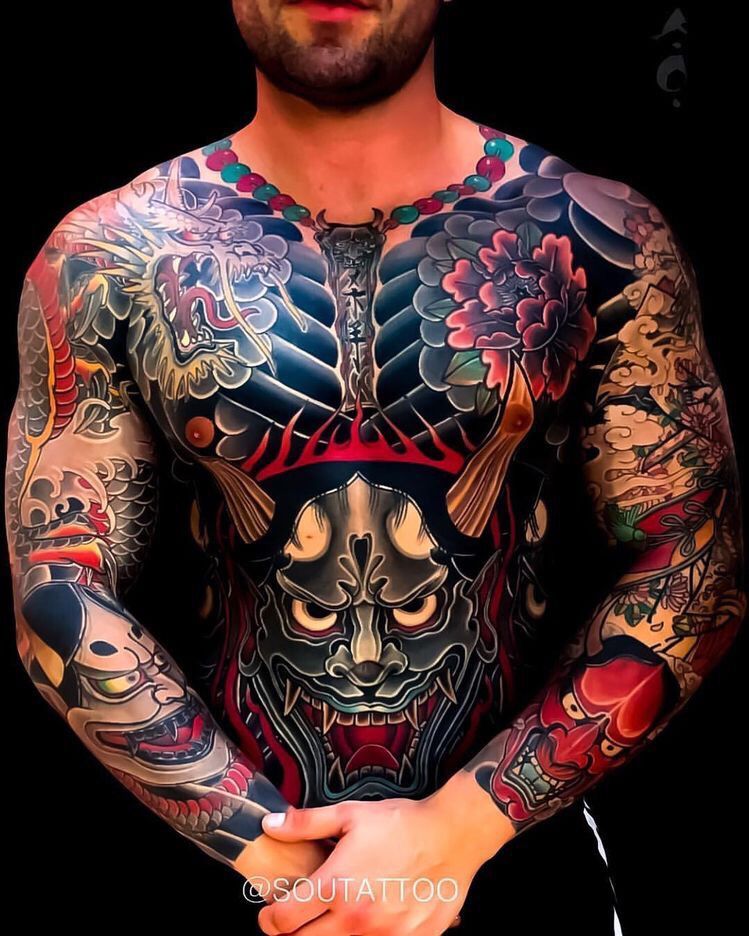
Koi Fish: Symbol of Determination and Perseverance
Koi fish, often depicted swimming upstream, represent determination and perseverance in the face of adversity. These magnificent creatures are known for their ability to transform into powerful dragons once they overcome obstacles. Yakuza members embrace the koi fish symbolism as a testament to their resilience and unwavering commitment to their goals.
Cherry Blossoms: Transience and the Beauty of Life
Cherry blossoms hold profound meaning in Japanese culture, and their inclusion in Yakuza tattoos is no exception. These delicate flowers symbolize the transient nature of life, reminding wearers to cherish every moment. Yakuza members connect with the cherry blossom’s ephemeral beauty, acknowledging the fleeting nature of their own existence.
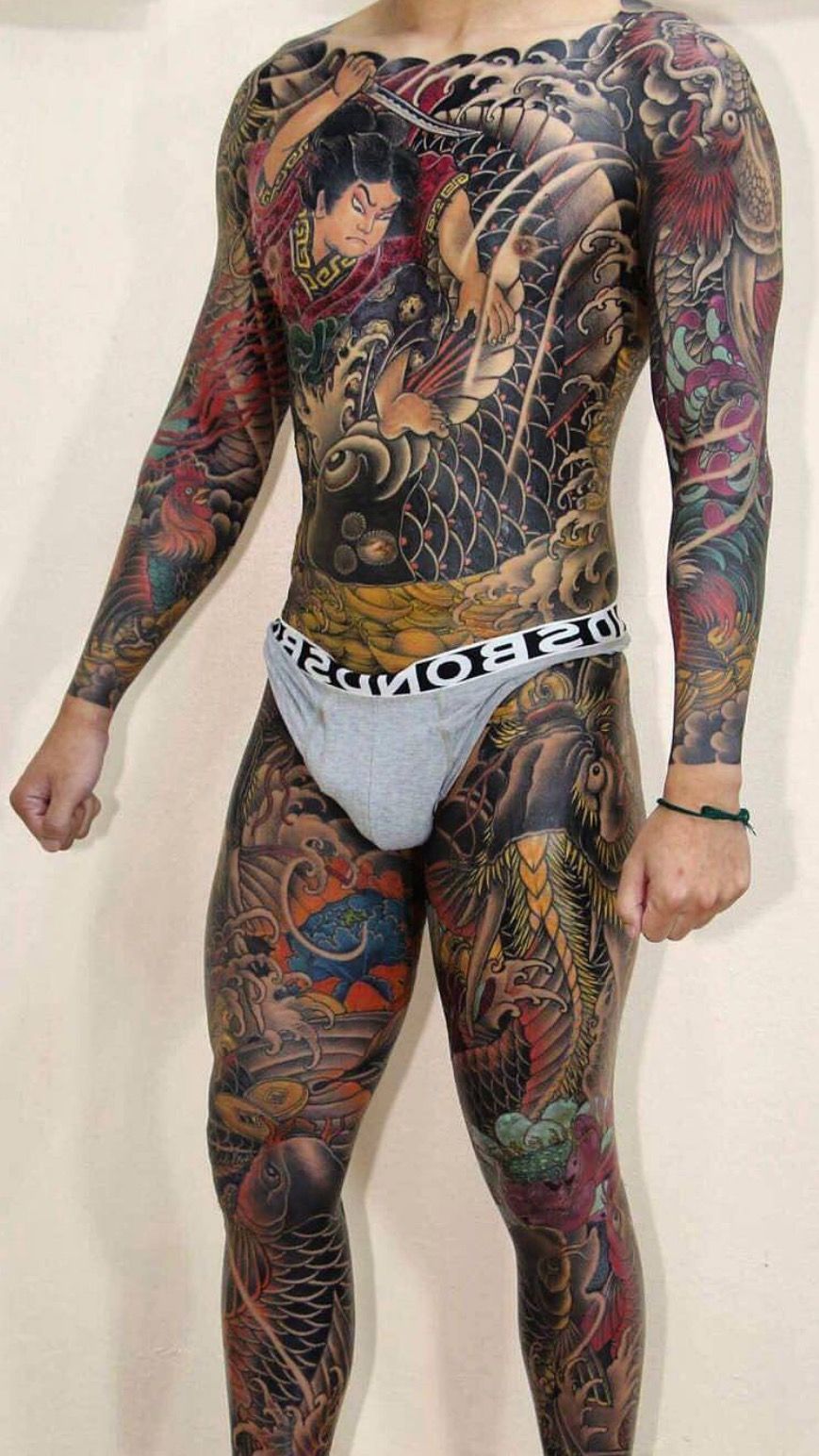
Samurai: Honor, Discipline, and Bushido
Samurai warriors embody the essence of honor, discipline, and the ancient code of Bushido. Depicting samurai warriors in Yakuza tattoos signifies a deep respect for these virtues and a commitment to upholding them within the Yakuza brotherhood. The samurai symbol serves as a reminder to remain steadfast in the face of challenges and to adhere to a strict moral code.
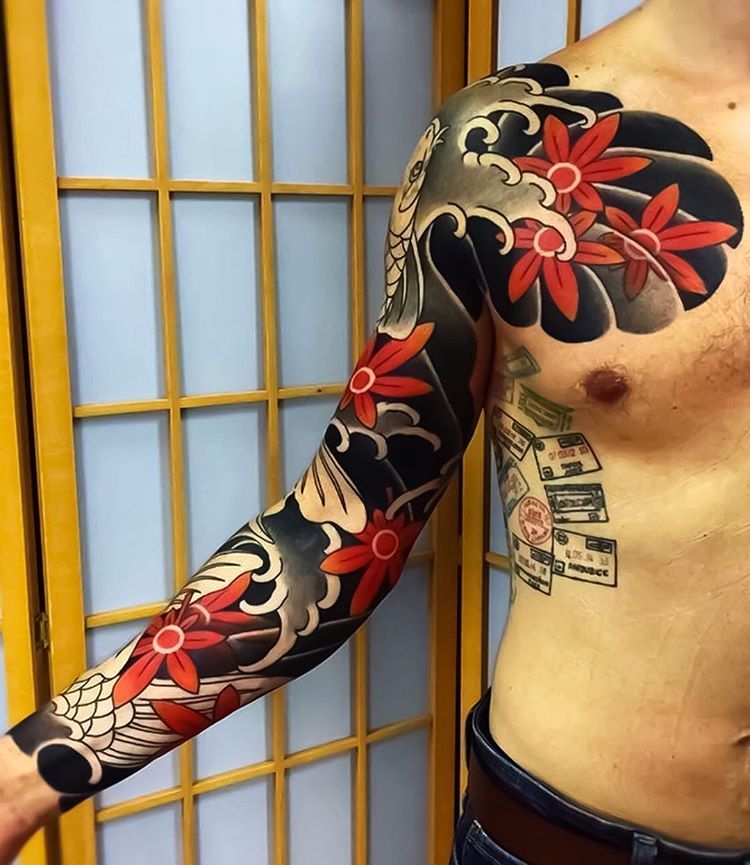
Geisha: Elegance, Mystery, and Feminine Power
Geisha, traditional female entertainers in Japan, represent elegance, mystery, and feminine power. In Yakuza tattoo designs, geisha often personify beauty and resilience. They serve as a homage to the allure and strength of women while recognizing the vital role they play within Yakuza culture.## Yakuza Tattoo Designs: A Fusion of Artistry and Symbolism
Yakuza tattoo designs are renowned for their intricacy and exquisite craftsmanship. These masterpieces of body art require the expertise of skilled tattoo artists who possess a deep understanding of Yakuza symbolism. Let’s explore some popular Yakuza tattoo designs:
Full-Body Suits (Irezumi): Immersive Artworks
Full-body suits, known as “irezumi,” are the pinnacle of Yakuza tattoo designs. These elaborate compositions cover the entire body from neck to toe, creating a mesmerizing tapestry of interconnected images. Irezumi requires immense dedication and endurance, as the process can take years to complete. Each element within the suit tells a story, intertwining various symbols to reflect the wearer’s rank, life experiences, and personal journey within the Yakuza.
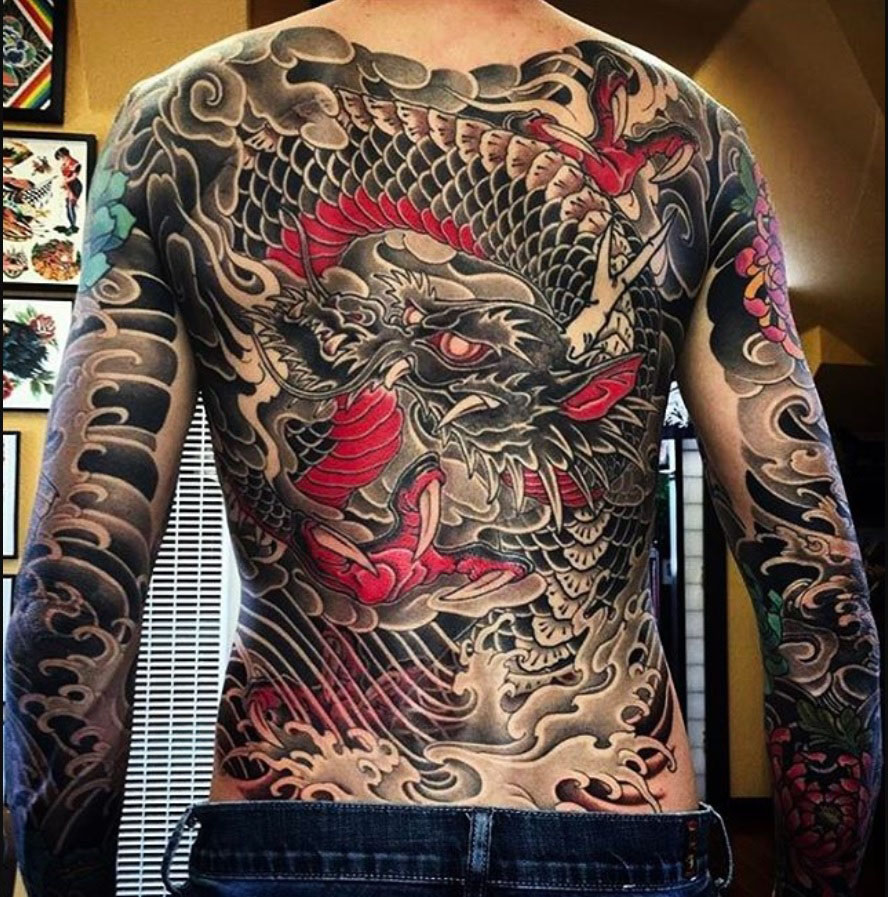
Sleeve Tattoos: Expressions of Strength and Identity
Sleeve tattoos are another popular choice among Yakuza members. These designs extend from the shoulder down to the wrist, allowing for intricate depictions of powerful symbols. From fierce mythical creatures to traditional Japanese motifs, sleeve tattoos serve as bold expressions of strength, identity, and Yakuza affiliation. They showcase the wearer’s commitment to the organization while making a striking visual statement.
Back Tattoos: Stories of Honor and Brotherhood
The back serves as a vast canvas for Yakuza tattoo designs. Here, large-scale artworks unfold, depicting scenes of honor, brotherhood, and personal achievements. Images of dragons, samurai battles, or geisha elegantly adorn the back, narrating tales of loyalty and resilience. Back tattoos hold considerable significance within Yakuza culture and are often reserved for high-ranking members who have proven their unwavering commitment to the organization.
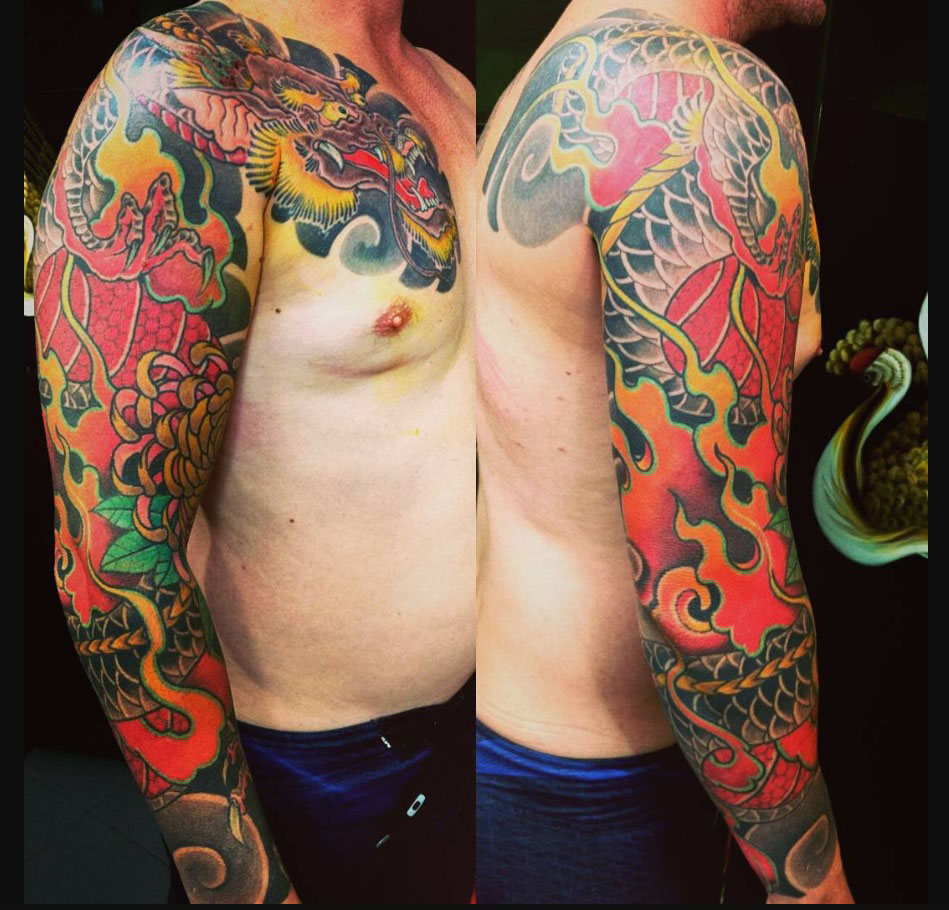
Chest Tattoos: Symbols of Protection and Guidance
Chest tattoos in Yakuza culture are imbued with symbolism related to protection and guidance. A prominent design often seen in this area is the dragon, which wraps around the chest as a powerful guardian. Other symbols, such as lions or tigers, represent inner strength and provide a sense of protection to the wearer. Yakuza members choose chest tattoos strategically, seeking both physical and spiritual fortitude.
Leg Tattoos: Embodying Perseverance and Tradition
Leg tattoos are an integral part of Yakuza tattoo culture, representing the wearer’s unwavering perseverance and respect for tradition. These designs often feature elements like koi fish swimming upstream or cherry blossoms symbolizing the transient nature of life. With every step, Yakuza members carry the stories of their past and the reminders of their commitment to the Yakuza code.
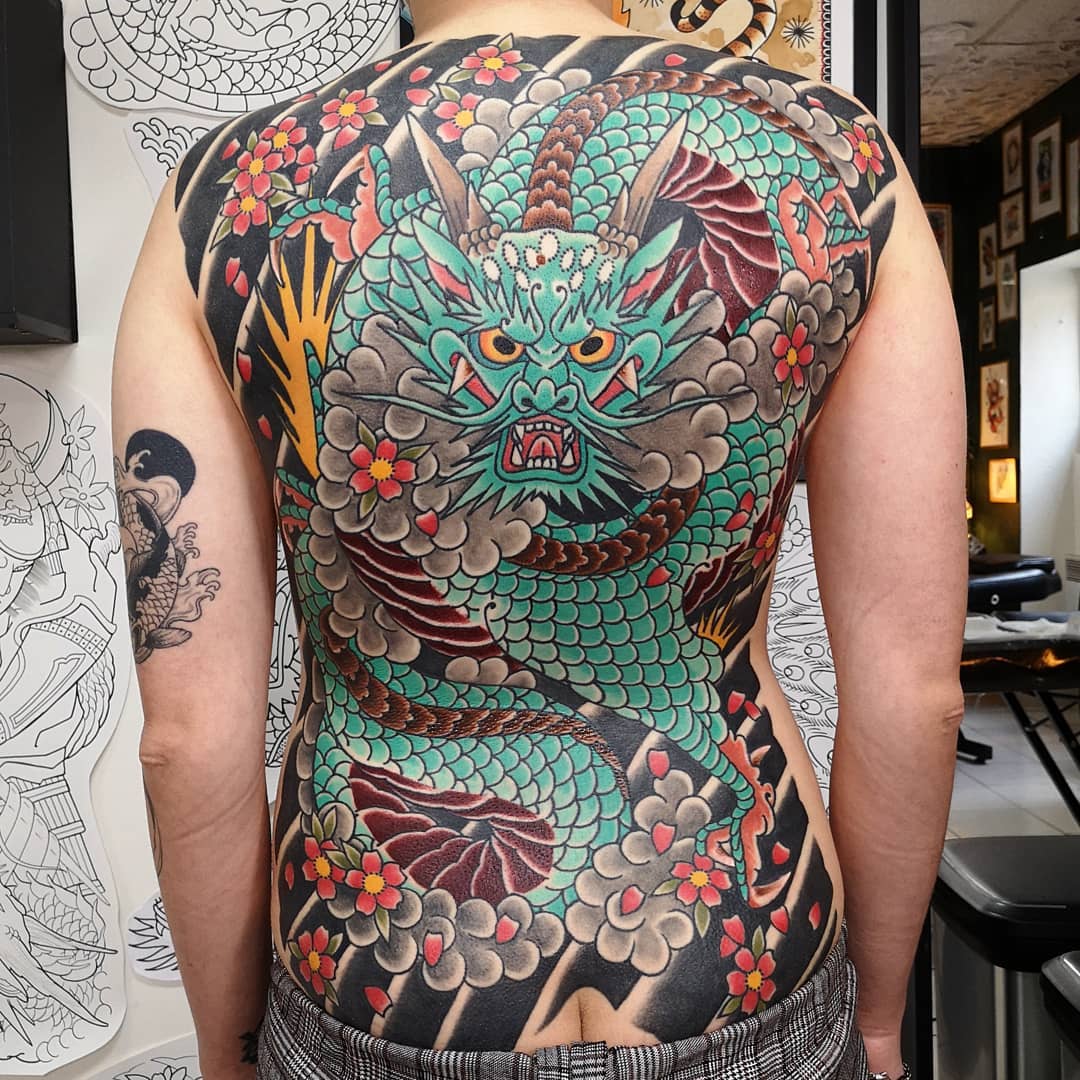
Meaning of Different Yakuza Tattoo Designs and Interpretations
Yakuza tattoo designs are known for their intricate details, vibrant colors, and meticulous craftsmanship. These elaborate artworks captivate the imagination and showcase the skill and artistry of the tattoo artists who bring them to life. Below are some popular Yakuza tattoo designs that have gained recognition for their beauty and complexity.
Full-Body Suits: Irezumi Tattoos
Irezumi, meaning “inserting ink,” refers to the traditional Japanese method of creating full-body tattoos. Yakuza members often opt for these ornate, sprawling designs that cover their entire backs, chests, arms, and legs. These tattoos weave together various symbols and motifs, telling a story unique to each individual. Irezumi tattoos require immense dedication, time, and pain endurance, reflecting the commitment and loyalty of the wearers.
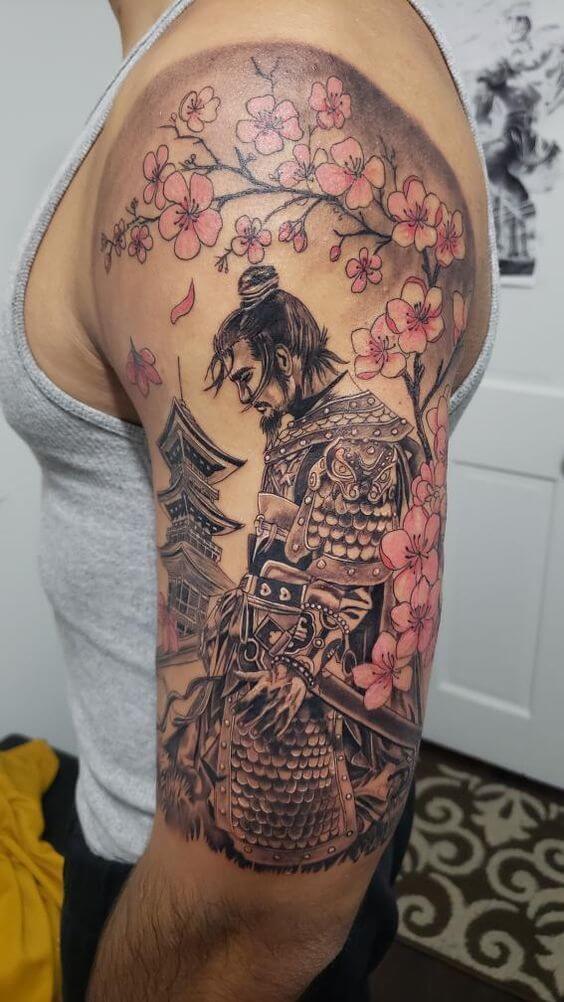
Geisha Tattoos: Symbolizing Beauty and Mystery
Geishas, elegant female entertainers, hold a significant place in Japanese culture. Yakuza members sometimes choose to adorn their bodies with geisha tattoos, which represent both the allure and enigmatic nature of these traditional figures. Geisha tattoos often display intricate kimono patterns, delicate facial features, and subtle expressions, capturing the essence of beauty and mystery.
Cherry Blossom Branches: A Symbol of Transience
As mentioned earlier, cherry blossoms are a common motif in Yakuza tattoo designs. These delicate flowers symbolize the ephemeral nature of life and the inherent beauty found in its fleeting moments. Cherry blossom branches gracefully cascade across the body, creating an ethereal and captivating visual representation of the transience of existence.
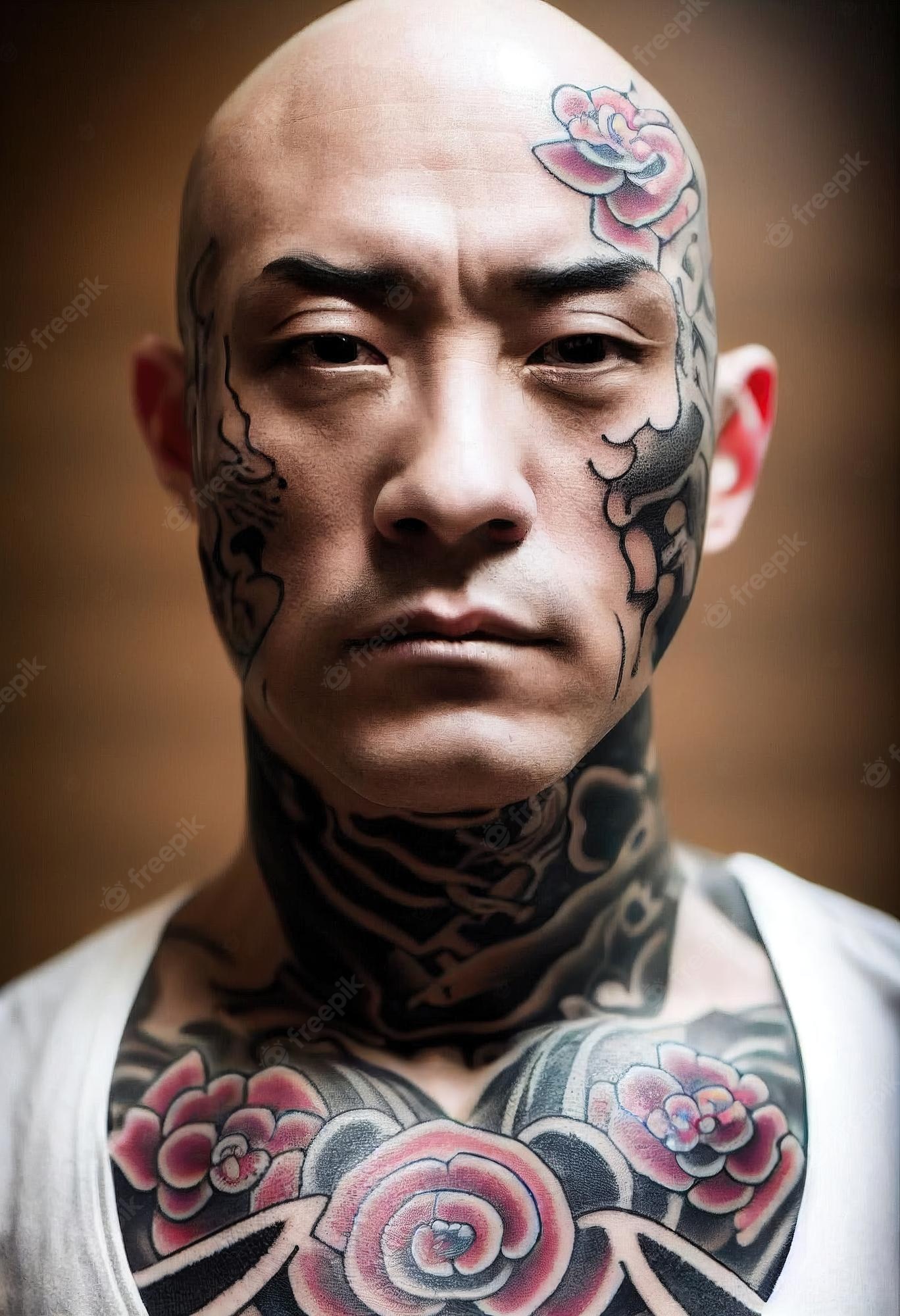
Waves and Water: Symbolizing Power and Adaptability
Water-themed tattoos, such as crashing waves or serene rivers, hold deep symbolism within Yakuza culture. Water represents power, adaptability, and the ability to overcome obstacles. Yakuza members often choose these designs as a reflection of their resilience and unwavering determination to navigate the treacherous currents of their criminal lives.
Mythical Creatures: Dragons, Phoenixes, and Kirins
Mythical creatures feature prominently in Yakuza tattoo designs, adding an element of mystique and awe. Dragons, phoenixes, and kirins (mythical beasts resembling a combination of dragon, deer, and unicorn) embody strength, power, and transcendence. These legendary creatures serve as protectors and bringers of good fortune, instilling a sense of invincibility and auspiciousness in those who bear their images.
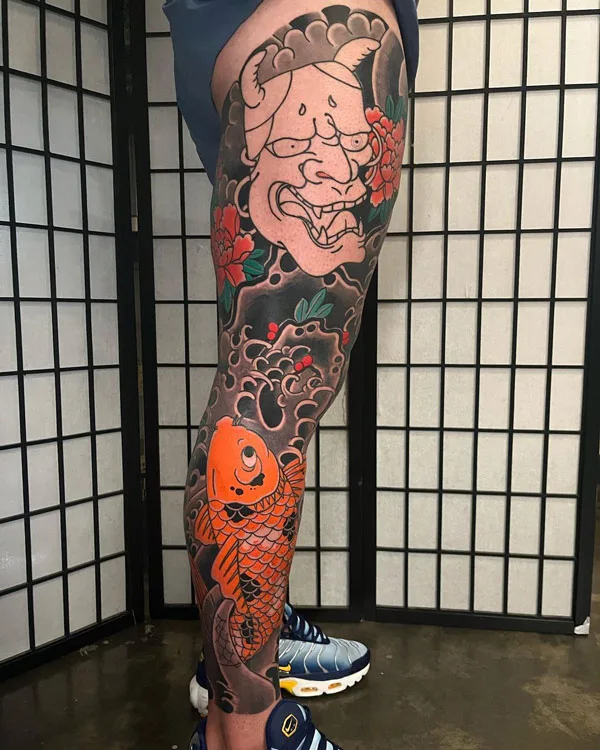
Conclusion: The Enduring Legacy of Yakuza Tattoos
Yakuza tattoos embody a captivating blend of artistry, symbolism, and cultural heritage. These intricate designs serve as visual narratives, recounting tales of loyalty, resilience, and honor within the Yakuza organization. As an enduring symbol of commitment, Yakuza tattoos continue to fascinate and captivate both enthusiasts and onlookers alike. While their visibility may have waned, the legacy and cultural significance of Yakuza tattoos endure, reminding us of the profound impact body art can have on personal identity and storytelling.

I am Harvey Berry, a tattoo enthusiast who has immersed himself in the diverse world of ink, passionately exploring the beauty and artistry within each tattoo. My mission extends beyond uncovering the aesthetics of tattooing; it involves sharing in-depth knowledge across all aspects of this art form.
Fueled by genuine curiosity and love for every facet of tattooing, I have diligently crafted well-researched articles, with a special focus on the Tattoo Meaning of Impeccable Nest section. Here, my aim is to help the tattoo community gain a deeper understanding of the meanings and values embedded in each tattoo.
One of my primary goals is to encourage responsible decision-making when it comes to getting inked. I recognize that choosing to get a tattoo is a significant personal decision that requires careful consideration. Hence, I provide diverse resources covering the meaning of tattoos, the tattooing process, aftercare tips, and other valuable information.
Whether you are a seasoned tattoo enthusiast or embarking on your first exploration of the world of body art, I aspire to be a reliable resource for you at every step of your journey. I hope that my extensive knowledge of tattoos, especially in the Tattoo Meaning section, will assist you in finding inspiration to express yourself through the art of tattoos.
